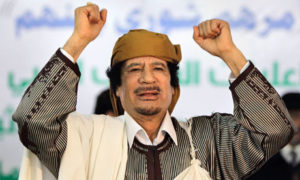by WorldTribune Staff, October 18, 2016
Many Libyans, frustrated by poor government services, higher prices for almost everything and a country steeped in chaos have grown to miss life under longtime dictator Col. Moammar Gadhafi.
Five years after then-Secretary of State Hillary Clinton famously exclaimed, “we came, we saw, he died,” residents of the war-torn nation are adding “you ruined” to the equation.

“NATO’s military intervention may have been a resounding success for America’s military elite and oil companies but for the ordinary Libyan, the military campaign may indeed go down in history as one of the greatest failures of the 21st century,” said Garikai Chengu, a research scholar at Harvard University.
The uprising that resulted in Gadhafi’s death, which Clinton pushed President Barack Obama to support, led to a power void in Tripoli, the rise of militias, loss of oil revenue and opened the door for terrorists to walk in and further add to the chaos.
“I hate to say it but our life was better under the previous regime,” says Fayza al-Naas, a 42-year-old pharmacist, referring to Gadhafi’s more than four decades of rule.
Today, “we wait for hours outside banks to beg cashiers to give us some of our own money. Everything is three times more expensive.”
The NATO intervention, which so-called women’s advocate Clinton helped engineer, also has been disastrous for women in Libya.
Under Gadhafi, unlike many other Arab nations, “women had the right to education, hold jobs, divorce, hold property and have an income. The United Nations Human Rights Council praised Gadhafi for his promotion of women’s rights,” Chengu said.
“Nowadays, the new ‘democratic’ Libyan regime is clamping down on women’s rights. The new ruling tribes are tied to traditions that are strongly patriarchal. Also, the chaotic nature of post-intervention Libyan politics has allowed free reign to extremist Islamic forces that see gender equality as a Western perversion.”
The UN-backed Government of National Accord (GNA) has struggled to assert its authority nationwide since arriving in Tripoli in March, with a rival parliament in the country’s far east refusing to cede power to it.
On Oct. 14, the GNA suffered a new setback when a rival seized key offices in the capital and proclaimed the reinstatement of a third administration previously based in Tripoli.
Meanwhile, Libya’s eastern parliament has thrown its support behind Gen. Khalifa Haftar. While Haftar’s army, which has the backing of Egypt, has ousted most jihadists from Benghazi, the birthplace of the 2011 uprising, his detractors accuse him of working towards the single goal of seizing power to establish a new military dictatorship.
“Libyans are forced to choose between two extremes: either chaos with militias and Islamist extremists as the dominant forces, or military rule,” said Libya analyst Mohamed Eljarh. “No other convincing options are on offer.”
According to analyst Mattia Toaldo, Libya’s rival forces who might attempt to extend their influence in other areas of the country should expect to be met with tough local resistance.
“It is hard to think that the country will be stabilized any time soon,” said Toaldo. “Libyans seem to have swapped a repressive centralized authoritarianism with a more decentralized and chaotic form of authoritarianism, be it under militias or under the rule of general Haftar.”
